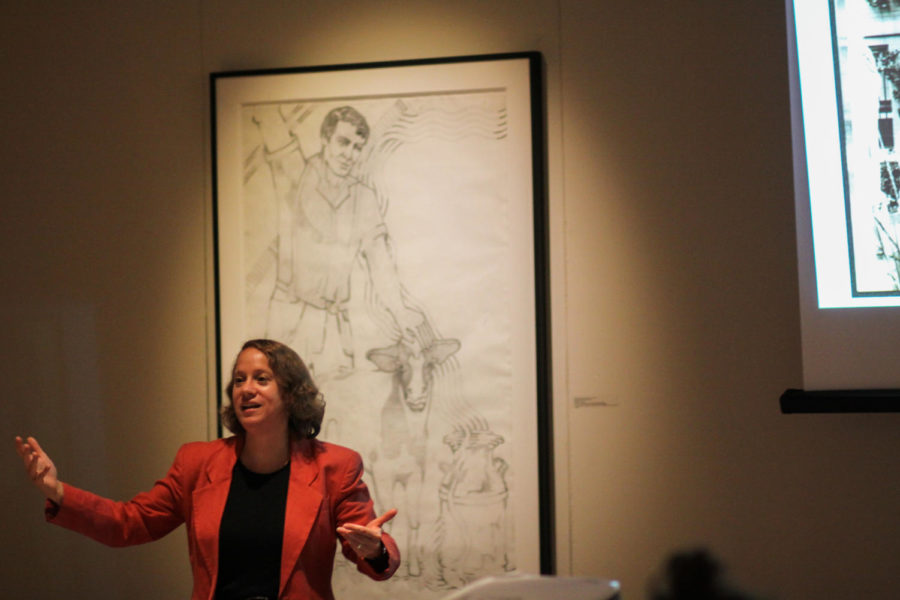ISU professor works to get women more recognition
September 25, 2014
Women have been left out of the “great man theory of history,” and Amy Bix said it’s important to recognize their accomplishments today.
Bix, associate professor of history, talked in the Brunnier Art Museum on Thursday about the history of the U.S. women’s suffrage movement.
The lecture, “After ‘America in the Making’: Women’s Suffrage,” focused on events and figures who brought about women’s rights to vote from the mid-1800s until 1920.
Brunnier Art Museum is exhibiting 12 paintings created by N.C. Wyeth, called “America in the Making.” The artist recreated 12 significant events and figures in history for a calendar by Ottumwa John Morrell & Co. in the 1940s.
The last painting exhibited is of Abraham Lincoln’s Second Inaugural Address in 1865. Bix said the paintings not only end prematurely but also keep women in the margins, often excluding them from being marked in history entirely.
The only woman featured in a painting is Sacagawea, a Native American woman who was a part of Lewis and Clark’s Corps of Discovery.
Bix was among several history experts to give a series of lectures at the museum.
“The museum [was] very conscious of the fact that these paintings very much present that great man theory of history,” Bix said. “Since women are absent and on the margins of these paintings, I thought it would be interesting to talk about something in women’s history.”
Bix mentioned several important female figures in history, such as Abigail Adams, Elizabeth Cady Staton and Iowa State’s own Carrie Chapman Catt.
Bix also discussed several key moments in the American suffrage movement, including the Seneca Falls Convention in 1848 and the ratification of the 19th Amendment in 1920.
Most schoolchildren do not learn about significant female figures or the suffrage movement because of the “great man theory of history,” Bix said.
She said that this theory leaves very little room for women.
“Women’s history can fascinate everyone,” Bix said. “We were always taught about men. Learning about men is important, but there’s so much more to it.”
Carol Elbert, an Ames citizen, agreed that half of history seemed to be missing from the books.
“When we were learning history in school, there really wasn’t much focus on women,” Elbert said.
Bix stressed the importance of knowing the history of women’s suffrage, and being aware of women’s rights in today’s world.
“We need to know women’s rights not just in the U.S., but globally as well,” Bix said.
Ames local Jennette Johannsen agreed that situations for women have greatly improved, but still believe it is important to know history.
“It’s important to know that there were these women who made a difference,” Johannsen said. “There’s so much of this history that you don’t think about because it wouldn’t cross your mind that you wouldn’t have the rights you have now.”
Sydney Marshall, senior in history, said women are a big part of American history and that women should be included in school curriculum.
“I haven’t had a lot of history classes that have talked about this, and I think this is always relevant to what’s going on in the world,” Marshall said.
One way women today can exercise their rights is by voting, which women won the right to do in 1920.
Early voting for the Iowa midterm elections began Sept. 25. Voters can submit an absentee ballot until Nov. 3 and Nov. 4 is election day.
“There are so many people who don’t vote,” Johannsen said. “Back then, people chained themselves to buildings just for that right. History is heritage and it’s important to know it.”







